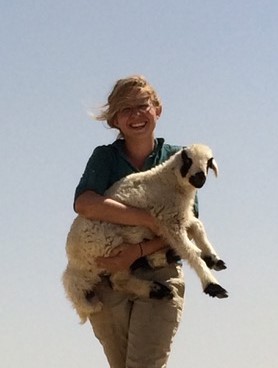RLIIM is an Emory University-affiliated project working in collaboration with the KRG Directorate of Antiquities and the Erbil Directorate of Antiquities. The project is comprised of both foreign and Kurdish archaeologists.

Project Director and Remote Sensing Specialist
Dr. Petra Creamer is an assistant professor of Ancient Near Eastern Studies at Emory University. She specializes in the Assyrian Empire, remote sensing techniques, and landscape archaeology, with a focus on how imperial powers affect non-elite populations under their control. You can learn more about her work (and keep up to date with RLIIM publications) here.

Project Representative
Kak Ahmed Jodat is the head of the Erbil Civilizations Museum as part of the Erbil Directorate of Antiquities of the KRG. He is RLIIM’s representative and oversees the excavations at Qach Rresh with Dr. Creamer.

Associate Director and Ceramic Specialist
Dr. Kyra Kaercher received her BA in Archaeology from the University of Wisconsin-La Crosse, USA in 2010. She then received her MA in Archaeology from Boston University after completing her MA exams on Identity, Ceramic Studies, and Iron Age Northern Iraq and Iran (Assyria and Urartu). She worked at the UPenn museum on the Ur Digitization Project as a research assistant and on the ASOR Cultural Heritage Initiatives and has just finished her dissertation at the University of Cambridge on the regionalization of ceramic production and consumption during the Middle Islamic Period. She has worked in Syria, Iraq, Egypt, Bolivia, England, and the USA. For this project she is interested in looking at the rural production of Neo-Assyrian ceramics.

Registrar
Glynnis Maynard is a current Ph.D. student in Archaeology at the University of Cambridge. Her research explores cultural variation and multimodality in depictions of demons and monsters in Neo-Assyrian glyptic and clay figures. She has previously excavated at Lagash in Southern Iraq and is participating in multiple projects on the Erbil plain, including at Qach Rresh and Surezha.

Microarchaeology Specialist
Dr. Elise Laugier is an NSF postdoctoral research fellow at Rutgers University and holds a Ph.D. from Dartmouth College in Ecology, Evolution, Environment, and Society (EEES). She is an environmental archaeologist focusing on long-term land use histories with dual areas of expertise in geospatial and microarchaeological approaches. She has worked as an archaeologist and cultural heritage specialist in the Kurdistan Region of Iraq (KRI) since 2015 and is also currently a member of the Erbil Plain Archaeological Survey (EPAS). Her research with RLIIM examines the microscopic record of Assyrian imperial land use practices and their long-term legacies on local ecosystems.

Archaeobotanical Specialist
Dr. Lucas Proctor is a postdoctoral researcher in the Institute for Archaeological Sciences at J.W. Goethe University-Frankfurt am Main and holds a Ph.D. in anthropological archaeology from the University of Connecticut. He specializes in environmental archaeology and archaeobotany, which he uses to research paleoenvironmental reconstruction, fuel economies, and agropastoralism. In addition to RLIIM, Lucas currently works on several international collaborative research projects in Iraqi Kurdistan, Turkey, and Oman.

Zooarchaeology Specialist
Laurel Poolman is a Ph.D. candidate in Near Eastern Archaeology at Johns Hopkins University. With specialties in zooarchaeology, environmental archaeology, and the archaeology of Upper Mesopotamia, her research explores the impact of multispecies communities on ancient political structures, most notably the Neo-Assyrian Empire. She has been the lead zooarchaeologist at Zincirli Höyük since 2016, but also conducted fieldwork at projects across Kurdistan, Ethiopia, and Turkey. Her work at RLIIM will explore themes of localized subsistence, community adaptation, and environmental relations.